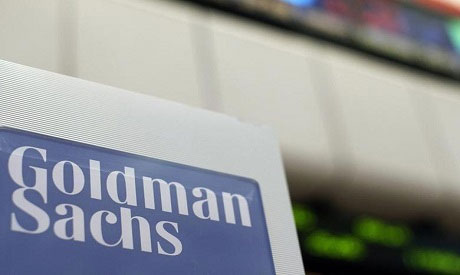
File Photo A Goldman Sachs sign is seen on the floor of the New York Stock Exchange. REUTERS
Egypt’s banking sector has sizable foreign currency reserves, which allows policy makers to mitigate the pressures imposed on the Egyptian pound in the event that foreign inflows into the country experience any fluctuations in the coming months, Goldman Sachs said in a report issued Monday.
Egypt has introduced the highest real interest rates on sovereign bonds in emerging markets, the report said, predicting that it could potentially attract investors that are keen on investing in the country’s debt instruments.
The investment banking company, however, claimed that the Egyptian pound is “somewhat overpriced”, adding that the country’s external balances and the competitiveness of the currency are at risk over the long term.
The probable action of listing Egypt in the JP Morgan Emerging Markets (EM) Bonds Index is still an incentive that would increase global demand on the Egyptian pound and enhance the quality and stability of financing the current account deficit.
The Egyptian pound currently trades at around 15.7 to the US dollar, down from an average of $18 in December 2016, when Egypt initiated the flotation of its currency as part of its economic reform programme.
In April, Minister of Finance Mohamed Maait announced that Egypt is expected to join the JP Morgan EM Bonds Index within a period of six months; a development that is projected to give Egypt a 1.7 percent weighting in the index at a total of 24 billion dollars.
The minister added that Egypt was removed from the index in 2011 after failing to meet the requirements of the index.
The inclusion will make Egypt the second country in the Middle East and Africa to join the index, besides South Africa.
In September 2020, Goldman Sachs said that it expects Egypt’s hard currency inflows will increase and that the Egyptian pound will maintain its stability.
The banking company also predicted that the Egyptian pound will maintain its strong performance and continue to tick upwards against the US dollar without causing any significant threat to the competitiveness of Egyptian exports.
In a recent report, the global credit rating institution Standard & Poor’s said that the amount of outstanding bonds issued in Egyptian pounds jumped to $30 billion by the end of August 2021, up from $10 billion in June 2020.
However, with the increasing expectation that interest rates in European and US markets will likely normalise, investors may withdraw their capital from Egypt and reinvest it in other types of ‘safe investments’.
The Monetary Policy Committee (MPC) of the Central Bank of Egypt (CBE) is anticipated to convene on Thursday to review the key interest rates.
In its last meeting, held on 5 August, the MPC decided to keep the CBE’s overnight deposit rate, overnight lending rate, and the rate of the main operation unchanged at 8.25 percent, 9.25 percent, and 8.75 percent, respectively.
The discount rate was also kept unchanged at 8.75 percent.
Short link: